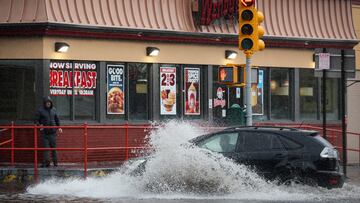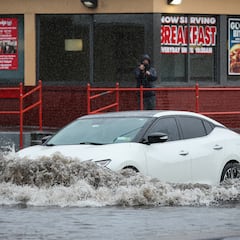How does flood insurance work? How much does it cost?
The vast majority of American households lack flood insurance despite the risk being present in all 50 states and increasing as the climate changes.

Recent flooding in the US, and more specifically in NYC, have people asking about flood insurance for their properties. Most homes and businesses are not required to have flood insurance, only those that are located in high-risk flood areas with mortgages from government-backed lenders. According to a 2023 Triple-I/Munich Re Consumer Survey, 64 percent of homeowners said that their residence was not at risk.
So, it should not come as a surprise that the vast majority forgo purchasing the extra coverage which isn’t provided by regular homeowners insurance. According to Simply Insurance around 85 percent of homeowners are uninsured against flooding. But as the Munich Re report points out, “anywhere it can rain, it can flood - so almost everyone can be at risk.”
According to FEMA, 99 percent of US counties have experienced a flooding event between 1996 and 2019. Even of the homeowners who do think their home could be flooded, slightly more than two out of ten, only 78 percent purchased coverage. Not having a policy to cover damages from excess water inundating your residence can be costly. The Federal Emergency Management Agency (FEMA) says that “just one inch of floodwater can cause up to $25,000 in damage.”
How much does flood insurance cost?
The cost of acquiring flood insurance pales in comparison to what is paid out. While prices vary depending on factors like the risks associated with your home being flooded, its size and age as well as what kind of policy you choose and the amount of coverage, according to NerdWallet’s analysis of 2023 National Flood Insurance Program (NFIP) rates the average premium in the US is $739 a year.
The NFIP paid out on average $52,000 per claim in 2019.
.@divya_sangam, LendingTree's insurance expert, discusses Tropical Storm Hilary's impact on the home insurance market: pic.twitter.com/6q9khH5gLV
— Yahoo Finance (@YahooFinance) August 21, 2023
How does flood insurance work?
Homeowners, renters and businesses can purchase flood insurance through your insurance company or agent. The NFIP is managed by FEMA through a network of over 50 insurance companies and is available to anyone no matter the flood risk. There are two types of coverage to choose from: building coverage and contents coverage.
Building coverage covers the physical structure, permanent features of the house and certain appliances. While contents coverage your personal items and other possessions inside the structure.
Related stories
Not every type of flooding is covered, for example if the sewer backs up that would not be covered, unless it was a direct result of flooding. A flood is defined by FEMA as “an excess of water on land that is normally dry, affecting two or more acres of land or two or more properties.” For more information you can consult the government Flood Smart website.
Those who wish to purchase flood insurance should also keep in mind that the policy typically won’t take effect until after 30 days have passed. Exceptions being if the acquiring of coverage is mandated as part of financing the purchase a property through a federally backed lender or as a result of a community flood map change.
New York City emergency officials have issued a travel advisory as heavy rain and flooding hits https://t.co/E30q97yK2O pic.twitter.com/xw1EgGvXmM
— philip lewis (@Phil_Lewis_) September 29, 2023


